

by John Helmer, Moscow
@bears_with
Everything, including artillery fire, infantry movements, launch of drones, rockets and refugees, even losses of territory and men, is planned by three Turks – President Tayyip Recep Erdogan (lead images); Defence Minister and former head of the Turkish General Staff, Hulusi Akar; and Hakan Fidan, head of the National Intelligence Organization (in Turkish, MIT). Call them the Sultan and the Ugly Viziers (SUV).
An SUV is never as serious as it would like to appear. This Turkish SUV also planned the July 2016 coup in Istanbul and Ankara. Nothing they do, including the sacrifice of large numbers of their own people, will result in a military coup to remove them, no matter how costly their mistakes. Those Turks who can calculate their mistakes are in jail or dead.
The SUV has decided to fight for Syria outside the lines of the Sochi agreement. With artillery firing from the Turkish side of the Syrian border, they decided to fight a new battle for Saraqib, east of Idlib, and succeeded. In the battle they lost up to 60 regulars; the Syrian Army lost more than a thousand. The Syrians have gained in the south of Idlib; they have lost Saraqib. They must retake it and hold it; they will; they have done so.
Russian forces have now established a cordon around the city. They have restored air cover for the Syrian Army, and just as importantly, extended their electronic counter measure (ECM) defences to the frontier and further. The drones on which the SUV depended for targeting their long-range guns and for attacking Syrian Army units have been neutralized. The Russian resupplies now arriving by sea and air are more than a match for the small force the SUV has committed so far.
Defeat makes the SUV keener than ever to hide their weakness. Akar has retreated from his field headquarters in the south to Ankara, as the SUV prepares to meet Putin and the Stavka on Thursday in Moscow. A Russian military analyst reports the General Staff assessment awaiting him: “General Akar should keep himself in check, because it is one thing to inflate the enemy’s losses somewhat and pass off old videos as fresh ones. It’s quite another to write fiction novels in the context of information war.”
The SUV responds to force of arms more than to the force of money. They calculate President Vladimir Putin and his Kremlin advisors are the opposite. The SUV will continue to operate NATO AWACS aircraft for attempting the same ambush tactics they used against the Russian Air Force in November 2015. The SUV will try to threaten with US weapons the Pentagon will not hazard in a losing fight. The Turks will push against the cowardice they have come to expect from the Greek Government in Athens and President Nikos Anastasiades in Nicosia. This has been a winning strategy for the SUV until they overreached with force instead of bluff. When the SUV goes through the Spassky Gate on Thursday, for the first time in the four hundred years since the Ottoman siege of Vienna, a single army, Russia’s, is defending all of Europe.

Left to right: General Akar with President Erdogan (2018); Minister Akar with Hakan Fidan (2019).
On March 1, Akar announced Operation Spring Shield. He said this was retaliation for “the heinous attack [on Turkish troops] on February 27.” He struck at the Syrian lines of least resistance, encouraging the armchair warriors reporting in English to claim “the situation there will not likely improve due to the lack of any decisive action by Damascus and its allies.”
In London, a well-known international banker was convinced that Putin, he said, “had walked into a trap over a worthless piece of Syrian sand – and just when business with Russia was showing signs of recovery.” That’s money talking the way the SUV thinks it should.
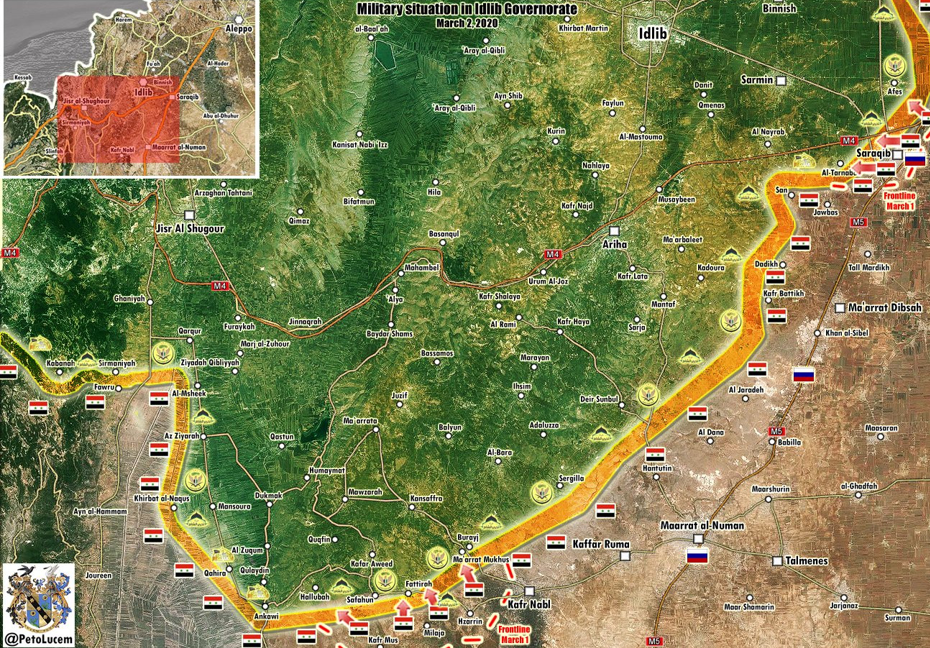
Source: Moon of Alabama, PetoLucem. For a larger image, go to the original display.
Elements of the Iranian and Lebanese Islamic forces responded also, reporting through Elijah Magnier. He claimed “Russia made a mistake in not preventing the Turkish drones from attacking Syrian-controlled territory in Idlib. Moreover, Russia made another grave mistake in not warning its [Syrian Army] allies that the political leadership in Moscow had declared a one-sided ceasefire, exposing partners in the battlefield and denying them air cover. This is not the first time Russia has stopped a battle in the middle of its course in Syria.”
Russian sources say these claims are false. There was no Russian ceasefire, but the Syrians moved beyond air and electronic cover, the sources say, and were unable to return fire against Turkish artillery firing from Turkish territory. Yevgeny Krutikov reported the General Staff assessment in Moscow: “The loss of Saraqib on February 28 was primarily due to the fact that the Syrian government army was not ready to withstand the level of fire support provided to the militants by Turkey. In addition … the most efficient parts of the Syrian army were withdrawn from the first line and they began to be transferred to the al-Gaab valley in the southern part of Idlib, where a successful SAA [Syrian Arab Army] operation is developing in parallel. The reservists who remained at the first line did not even begin to ‘equip engineering structures’; that is, simply speaking, to dig trenches. The positions were not covered by air defence, as a result of which Turkish drones simply terrorized the Syrians. At the same time, the Turks themselves actively used electronic warfare, which further complicated the communications of the Syrian army. The effect of surprise was also effective — no one was expecting something like this from the Turks.”
The Russian count is that Turkish troops in Akar’s operation around Idlib amount to four or five battalion groups of no more than five thousand men, plus 80 tanks. Special forces and instructors have been inserted into the local jihadi units to improve their intelligence, coordinate movement and multiply firepower.
Strike, cut and run from the field – this, according to another report from Vzglyad, is the SUV’s tactic. “In their ranks there are one or two Turkish Leopard tanks, which, after shooting a little, depart in the direction of the ‘observation posts’ of the Turkish army. Turkish armoured personnel carriers are working as taxi drivers to deliver the militants…closer to the front line. Thus, under the cover of Turkish artillery, the militants of Tahrir al-sham (former al-Qaeda) are approaching the Syrian positions as quickly as possible and entering into close combat. This is visible to the naked eye, but the Turkish side does not transmit the coordinates of the location of its troops to the Russian side. It is impossible to separate the soldiers of the Turkish army from the Turkish proxies during the battle – the fighters of the NFO (National Liberation Front) are dressed in Turkish military uniforms — unless they have beards. So losses among Turkish military personnel are inevitable.”
With and without beards, the combination is too weak to withstand the Russian-Syrian counterattack, however. Read more of Krutikov’s battlefield report.
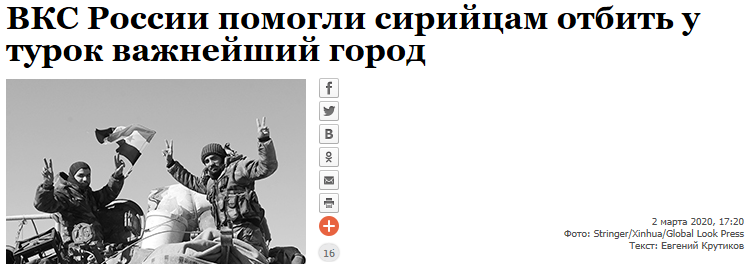
Source: https://vz.ru/
The SUV has now reinforced the Russian assessment that, as Krutikov reported on Monday, “the situation in Idlib has no solution other than military. You can negotiate with the Turks as much as you like, about anything from joint patrols to ‘disarmament’. But on the ground, it is only possible to destroy all militant groups that are not ready to integrate into the new Syrian society. Yes, the brutal battles for Saraqib were provoked precisely by the political and historical ambitions of Turkey, which continues to consider northern Syria its ‘hereditary’ territory. But in general, the problem of Idlib is not so much the Turks – they have their ambitions — but the presence of the jihadi gangs in their nests.”
“Given the fact that there is very little time left until March 5 – the designated date for talks in Moscow between Vladimir Putin and Recep Erdogan – we can expect a new attempt by the militants, supported by Turkish artillery and drones, to recapture Saraqib from government troops for the third time. Since the tactics of the militants and the Turks have not changed, it will all turn into a meat grinder again.”
Putin has responded, according to the Kremlin communiqués, by talking by telephone to the Iranian President Hassan Rouhani; French President Emmanual Macron; and presenting himself at ceremonies to honour Russian paratroops.
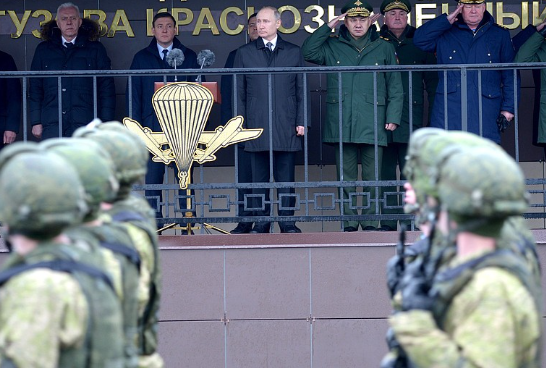
Source: http://en.kremlin.ru/
What is Putin explaining to the Europeans in NATO?
The Greeks and Cypriots are now subjugated as they have never been since the civil war of 1946-49 or the junta rule of 1967-74. They have no will – and no permission from US Ambassador Geoffrey Pyatt in Athens — to attack the Turkish drive of refugees towards the mainland border at the Evros River, and in even larger numbers at the Aegean islands from the Turkish coast.
Instead, last week the government of Kyriakos Mitsotakis in Athens was ordering its forces to fire on the Greek islanders of Lesbos and Chios who were protesting against plans to expand refugee camp capacities, and against the failure of the Greek military to resist the Turkish weaponizing of the refugees.

So far, there is no sign that the Greek military options against the Turkish refugee operations will be launched. That there are such options is the best kept military secret in Greece since March 1987, when the Greeks used armed force by surprise to defeat the Turks and US forces simultaneously; that was Prime Minister Andreas Papandreou’s operation, in coordination with President Todor Zhivkov of Bulgaria.
Then Europe meant Greece and Bulgaria. Now it means France, Germany, and UK in that order of increasing feebleness. The Greek veto cast at the NATO Council last week after Turkey had triggered an Article 4 consultation, was something less than brave – it was aimed as much at France, Germany, and the UK as at the Turks. Even then, the Greeks agreed to this language in the final NATO communiqué: “Today’s meeting is a sign of solidarity with Turkey… [The NATO] Allies offer their deepest condolences for the death of Turkish soldiers in last night’s bombing near Idlib. Allies condemn the continued indiscriminate air strikes by the Syrian regime and its backer Russia in Idlib province. We call on them to stop their offensive. To respect international law. And to back UN efforts for a peaceful solution.”
Read this again: Europe, including Greece and Cyprus, attacked Russia by deliberately misstating where the offensive had originated and from whom. The next day, February 29, when Putin spoke to Macron, he was too polite to tell him that if that’s what the French really think, they are welcome to defend themselves on the Greek line from Evros to Chios, and further the south with the French aircraft carrier and its squadron steaming between Limassol and the Syrian coast. That’s an operation Macron is calling Foch, after the last French general to believe he could defeat a serious enemy, when he couldn’t, and didn’t.
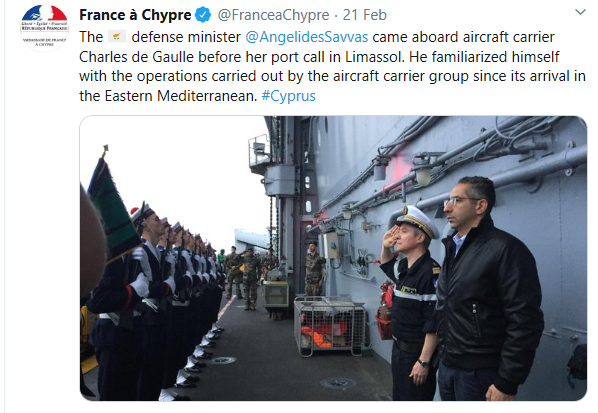
Source: tweeting by the French Embassy in Cyprus
At Putin’s last meeting with the Security Council on February 28, the Stavka assessment prevailed. The communiqué was the most explicit to condemn the Turks to which Putin has ever agreed: “The meeting participants emphasised that Russia did everything in its power during the Syrian offensive against terrorists to ensure the safety of Turkish military personnel stationed at the observation posts. No Turkish military personnel stationed there were injured or exposed to danger. The tragic cases when Turkish soldiers lost their lives occurred during the terrorists’ offensive operations. It was pointed out that Turkish military personnel was not supposed to be anywhere outside their observation posts in Idlib.”
Not even on November 25, 2015, when the Turks ambushed and shot down a Russian Air Force Su-24 was Putin as explicit in his condemnation. “We take a very serious view of what has happened”, Putin said then. Days later, when the Security Council convened and Putin was fully briefed, all he agreed to announce was: “The discussion focused on the increased tensions around Syria and Turkey’s aggressive and unpredictable action.”
Unpredictable? That’s not the Russian view of Turkish behaviour.
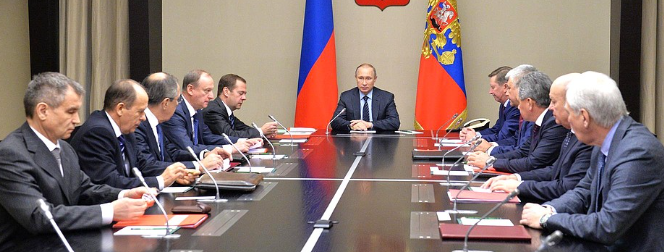
The Security Council in session, November 27, 2015 (left to right): Deputy Secretary of the Security Council Rashid Nurgaliyev, Director of the Federal Security Service Alexander Bortnikov, Foreign Minister Sergei Lavrov, Secretary of the Security Council Nikolai Patrushev, Prime Minister Dmitry Medvedev, the President, Chief of Staff of the Presidential Executive Office Sergei Ivanov, Interior Minister Vladimir Kolokoltsev, Defence Minister Sergei Shoigu, Director of the Foreign Intelligence Service Mikhail Fradkov, and permanent member of the Security Council Boris Gryzlov. Source: http://en.kremlin.ru/
Russian sources expect that at this Thursday’s meeting with the SUV, Putin cannot offer to negotiate a return to the Sochi agreement lines of disengagement. This is because even if Erdogan consents, there is no Russian trust in Turkish undertakings of any kind. Instead, the Russians will probe what the threshold of pain is for the SUV now. Colonel Cassad (Boris Rozhin) comments: “Turkey’s loss figure will not only grow in Syria. Interesting to ask – how many coffins from Syria and Turkey will stimulate serious questions to Erdogan from inside Turkey itself. It seems that Turkish society definitely has a certain pain threshold.” “Erdogan has essentially driven himself into an extremely narrow space for solutions, where he must either raise the casualty rates or look for opportunities to dig himself out of extremely dangerous scenarios.”











Leave a Reply